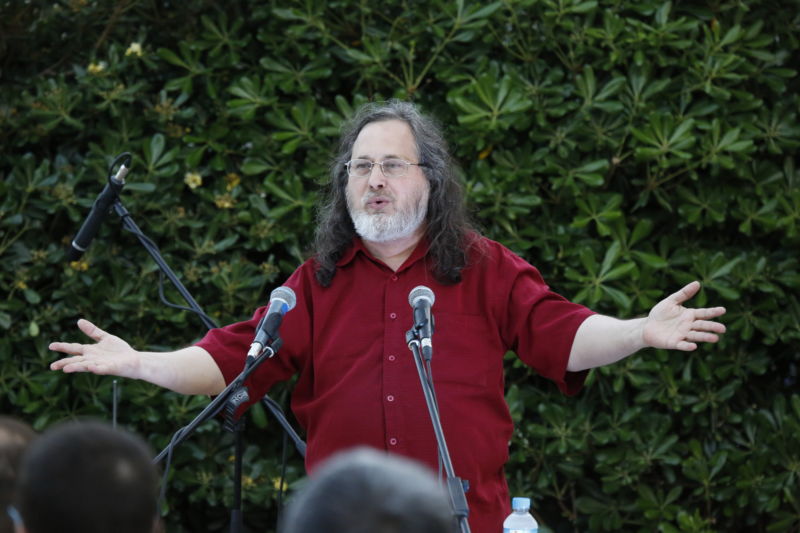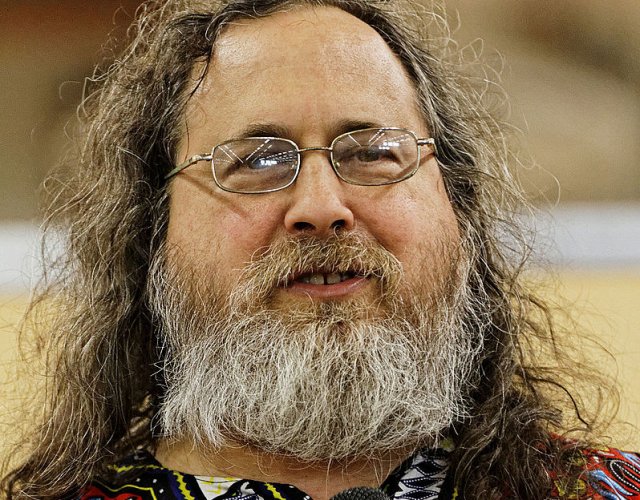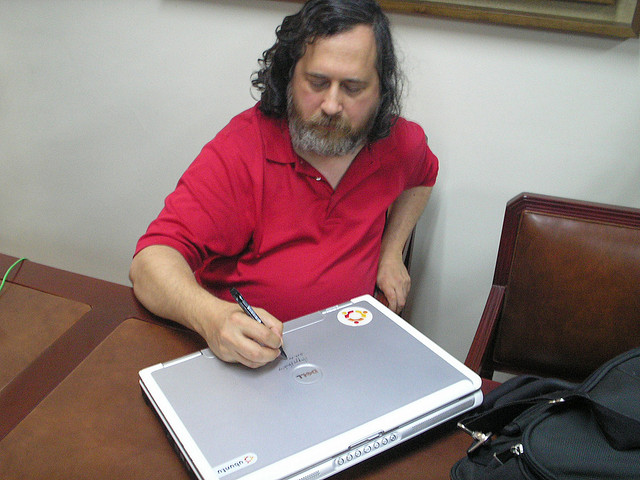Richard Stallman leaves MIT after controversial remarks on rape

Free software pioneer Richard Stallman has resigned from his posts at MIT and the Free Software Foundation after leaked emails showed him quibbling over the definition of rape in a conversation related to Jeffrey Epstein.
The conversation that triggered Stallman’s fall started when someone—names other than Stallman’s are redacted in the leaked emails—posted about a planned protest at MIT. The email stated that famed MIT computer scientist Marvin Minsky “is accused of assaulting one of Epstein’s victims.”
Stallman objected, saying that the blurb “does an injustice” to Minsky because even if it’s true that the then-17-year-old had sex with Minsky, “the most plausible scenario is that she presented herself to him as entirely willing.” (One witness to the alleged incident says that Minsky, who died in 2016, declined to have sex with her.)
Someone pointed out that the age of consent in the US Virgin Islands, where the incident allegedly occurred, is 18. That makes sex with a 17-year-old girl, “willing” or not, statutory rape. But Stallman wasn’t persuaded.
“I think it is morally absurd to define ‘rape’ in a way that depends on minor details such as which country it was in or whether the victim was 18 years old or 17,” Stallman wrote.
Stallman has always been a stubborn nonconformist

Stallman has long been famous for his extreme devotion to the cause of free software. He spearheaded the GNU project to produce a Unix-like operating system that would be free for anyone to use and modify. GNU software became a key part of the operating system most people today call Linux—to the immense irritation of Stallman, who believes the GNU components are significant enough that the package should be called GNU/Linux.
Also significant was Stallman’s philosophical, political, and legal work on behalf of free software. Stallman founded the Free Software Foundation in 1985 to advocate against the spread of proprietary software. By 1989, he had drafted the GNU General Public License, a “copyleft” software license that guarantees users the freedom to modify software as long as they share any resulting code under the same license.
For decades, Richard Stallman has traveled the world extolling the benefits of free software. Before he travels to give a speech, he frequently sends event hosts a lengthy email describing his conditions.
Stallman is legendary for his stubbornness and ideological inflexibility. Event organizers seeking to host Stallman are banned from using the terms “Linux” or “open source”—a term he views as a deliberate rejection of the moral stance implied by the term “free software.”
Stallman also makes a number of suggestions that have nothing to do with politics or software.
“If you can find a host for me that has a friendly parrot, I will be very very glad,” Stallman wrote in a 2012 edition of the email. However, he asked hosts not to purchase a parrot for his benefit.
“If you buy a captured wild parrot, you will promote a cruel and devastating practice, and the parrot will be emotionally scarred before you get it,” he wrote.
For decades, Stallman has refused to use any proprietary software, which has meant opting out of many contemporary technology products. If organizers want to stream his speech, they must arrange to do so using entirely free software—a nontrivial challenge in a world where so much video streaming software is proprietary.
That stubbornness was on display in the email thread that caused Stallman’s downfall at MIT. At one point, someone linked to a deposition given by one of Epstein’s victims.
“I visited that URL and got a blank window,” Stallman wrote. “It is on Google Drive, which demands running nonfree software in order to see it.” He asked someone else to download the file and send him the part relating to Minsky.
Stallman’s past statements stoked further outrage

When Stallman’s emails were published, it caused an uproar at MIT, in the free software community, and on the broader Internet.
People began digging into Stallman’s past writings and found other controversial comments. “I think that everyone age 14 or above ought to take part in sex, though not indiscriminately,” Stallman wrote in a 2003 post about the UK banning minors from having access to sexually explicit material. “Some people are ready earlier.”
“It is unnatural for humans to abstain from sex past puberty, and while I wouldn’t try to pressure anyone to participate, I certainly encourage everyone to do so,” he added.
In 2011, he criticized laws against child pornography. “‘Child pornography’ might be a photo of yourself or your lover that the two of you shared,” he wrote. “It might be an image of a sexually mature teenager that any normal adult would find attractive. What’s heinous about having such a photo?”
“Even when it is uncontroversial to call the subject depicted a “child”, that is no excuse for censorship,” he added. “Having a photo or drawing does not hurt anyone, so and if you or I think it is disgusting, that is no excuse for censorship.”
In the last week, after his comments received widespread attention, Stallman said he was rethinking some of these views.
“Many years ago I posted that I could not see anything wrong about sex between an adult and a child, if the child accepted it,” he wrote on Saturday. “Through personal conversations in recent years, I’ve learned to understand how sex with a child can harm her psychologically. This changed my mind about the matter: I think adults should not do that.”
In another post later the same day, Stallman objected to headlines saying he defended Jeffrey Epstein.
“Headlines say that I defended Epstein,” Stallman wrote. “Nothing could be further from the truth. I’ve called him a ‘serial rapist,’ and said he deserved to be imprisoned. But many people now believe I defended him—and other inaccurate claims—and feel a real hurt because of what they believe I said.”
“I’m sorry for that hurt,” Stallman added. “I wish I could have prevented the misunderstanding.”
On Monday, Stallman resigned from MIT “due to pressure on MIT and me over a series of misunderstandings and mischaracterizations.” He also resigned as president of the Free Software Foundation.
https://arstechnica.com/?p=1569379